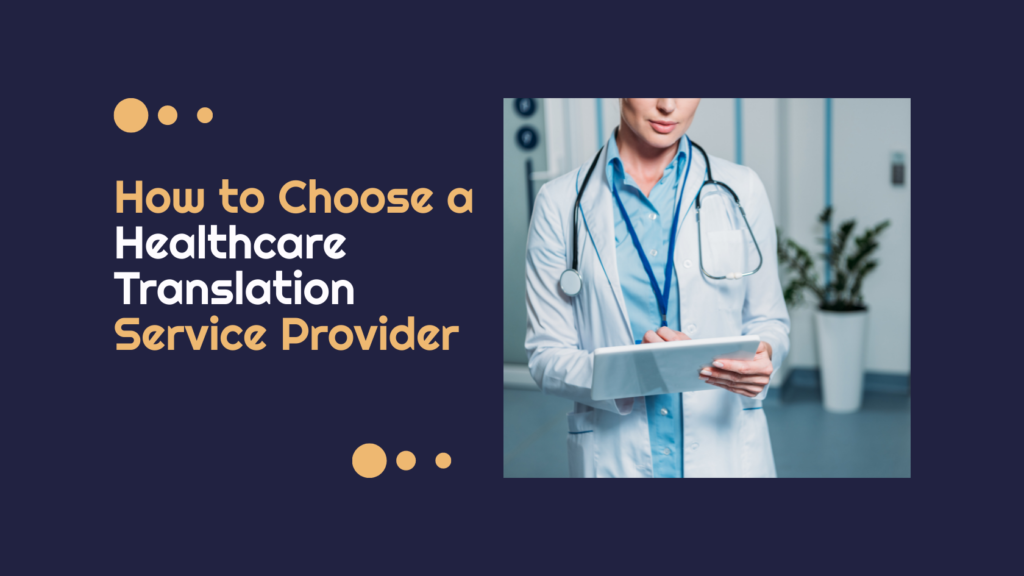
How to Choose a Healthcare Translation Service Provider
With diverse patient populations, healthcare providers must ensure that language barriers do not impede understanding and quality of care. Poor translations can lead to misunderstandings about medical conditions, treatment protocols, and informed consent, potentially resulting in detrimental outcomes for patients.
This article provides a comprehensive guide on selecting the right healthcare translation service provider, ensuring that communication is clear, effective, and culturally sensitive.
Table of Contents
Toggle1. Understanding Healthcare Translation
Healthcare translation encompasses the conversion of medical documents and information from one language to another while retaining their original meaning.
This field is not limited to simple text translation. It involves a deep understanding of medical terminology, cultural nuances, and the specific needs of the healthcare industry. Key types of documents requiring translation include:
Patient Records. Essential for accurate patient care and consistent treatment.
Consent Forms. Must be clearly understood by patients to ensure informed consent.
Clinical Trial Protocols. Critical for compliance and participant understanding in research settings.
Marketing Materials. Important for promoting services to diverse communities.
Cultural competence is a crucial aspect of healthcare translation. Translators must not only be fluent in the target language, but also understand cultural contexts that impact patient interactions and expectations.
2. Assessing Your Needs
Before embarking on the search for a translation service provider, it is crucial to assess your specific needs:
Determine the primary languages spoken by your patient population. This will help narrow down potential service providers who specialize in those languages. Consider the prevalence of dialects and regional variations as well.
In addition, different documents may require distinct expertise. For instance, translating clinical trial protocols demands a strong understanding of both medical science and regulatory language, while marketing materials may benefit from a focus on persuasive language and cultural relevance.
You should also evaluate how often you will need translation services. Understanding your volume of work can help you choose a provider that can scale their services accordingly, whether for one-off projects or ongoing needs.
3. Qualifications and Expertise
When evaluating potential healthcare translation service providers, qualifications and expertise are essential.
Healthcare is a specialized field, and not all translators have the necessary background. Look for providers with experience in medical translation, preferably with a focus on your specific area of healthcare (e.g., pharmaceuticals, nursing, telemedicine).
Moreover, check for professional certifications from recognized organizations, such as the American Translators Association (ATA) or ISO 17100 certification, which indicates adherence to international translation standards. These credentials can tell you a lot about the company’s professionalism.
Additionally, ensure that the provider understands relevant regulations, such as FDA guidelines for clinical trials or HIPAA regulations for patient confidentiality. Familiarity with the legal aspects of healthcare translation is crucial for compliance.
4. Evaluating Service Providers
Conduct online research to find potential candidates. Look for websites that outline their services, expertise, and client testimonials. Social media platforms and professional networks can also provide insights into their reputation.
Read reviews and testimonials from other healthcare organizations. Look for feedback on the accuracy of translations, adherence to deadlines, and overall client satisfaction.
You can also request case studies or examples of similar work they have completed. This will allow you to evaluate their abilities and quality.
You can also demand references from previous clients. Speaking directly to past clients can provide valuable insights into the provider’s reliability, quality, and customer service.
5. Quality Assurance Processes
Quality assurance is a critical aspect of healthcare translation. Inquire about the provider’s quality assurance framework. A robust QA process should include multiple stages of review to ensure accuracy and consistency. A multi-layered review process is essential for maintaining high standards.
Moreover, assess the use of technology, such as Computer-Assisted Translation (CAT) tools. These tools can enhance consistency and efficiency, especially for large volumes of work.
Lastly, confirm whether the provider maintains glossaries and style guides for specific projects. This practice helps ensure consistent terminology and tone across all documents.
6. Compliance and Confidentiality
Given the sensitive nature of healthcare information, compliance and confidentiality are indispensable.
Ensure the provider understands and complies with HIPAA regulations concerning patient privacy and confidentiality. This is non-negotiable when dealing with patient records.
Moreover, verify that the provider has strong confidentiality agreements in place. These agreements should clearly outline how patient data will be handled and protected. This includes NDAs.
7. Cost Considerations
While cost should not be the sole factor in your decision, it is an important element to consider.
Different translation services may use various pricing models, including per word, per hour, or project-based pricing. Understand the differences between each and how they align with your budget.
While choosing the cheapest option is tempting indeed, you usually get what you pay for. Balance cost with the provider’s expertise and the quality of their work.
Request detailed quotes from multiple providers. This will allow you to compare services and identify any hidden costs. Look for transparency in pricing and services included.
8. Make the Decision
After gathering and evaluating all necessary information, it’s time to make a decision.
Create a summary of your findings for each potential provider, noting strengths, weaknesses, and any concerns. Consider not just the data but also your instincts and experiences. A good working relationship is crucial for ongoing projects.
Take your time to ensure that you are making an informed choice that aligns with your organization’s values, needs, and long-term goals.
Gripon Global: A Pioneer in Healthcare Translation
Choosing the right healthcare translation service provider is a critical step in ensuring effective communication with patients and stakeholders.
If you’re looking for a trusted partner for your medical project, Gripon has got you covered. With a huge medical background and a wide experienced team, we can take on any project.